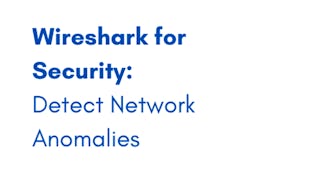Filter by
SubjectRequired
LanguageRequired
The language used throughout the course, in both instruction and assessments.
Learning ProductRequired
LevelRequired
DurationRequired
SkillsRequired
SubtitlesRequired
EducatorRequired
Results for "fraud detection"
 Status: Free Trial
Status: Free TrialUniversity of Washington
Skills you'll gain: Classification And Regression Tree (CART), Applied Machine Learning, Supervised Learning, Predictive Modeling, Text Mining, Machine Learning Algorithms, Feature Engineering, Data Cleansing, Scalability, Risking, Machine Learning, Natural Language Processing, Big Data, Probability & Statistics, Algorithms
 Status: Free
Status: FreeCoursera Project Network
Skills you'll gain: Threat Detection, Anomaly Detection, Network Security, General Networking, Network Monitoring, Network Troubleshooting, Real Time Data, Security Strategy, Network Analysis, Network Protocols, Data Capture

Skills you'll gain: Anomaly Detection, Google Cloud Platform, Application Deployment, Image Analysis, Cloud Computing, Computer Vision, Predictive Modeling
 Status: Free Trial
Status: Free TrialColumbia University
Skills you'll gain: Image Analysis, Computer Vision, Computer Graphics, Algorithms, Linear Algebra, Machine Learning Algorithms, Machine Learning

Skills you'll gain: Threat Detection, Threat Management, Cloud Security, Google Cloud Platform, Vulnerability Management, Vulnerability Assessments, Security Information and Event Management (SIEM), Public Cloud

Skills you'll gain: Anomaly Detection, Image Analysis, Computer Vision, Google Cloud Platform, Predictive Modeling, Artificial Intelligence, Product Development
 Status: Free Trial
Status: Free TrialJohns Hopkins University
Skills you'll gain: Generative AI, Fraud detection, Feature Engineering, Cybersecurity, Cyber Security Strategy, Threat Modeling, Deep Learning, Anomaly Detection, Artificial Intelligence, Security Testing, Machine Learning Methods, Reinforcement Learning, Machine Learning
 Status: Free Trial
Status: Free TrialNew York University
Skills you'll gain: Network Security, Firewall, Distributed Denial-Of-Service (DDoS) Attacks, Threat Modeling, Network Architecture, Intrusion Detection and Prevention, TCP/IP, Cybersecurity, Threat Detection, Cyber Attacks, Enterprise Security, Infrastructure Security, Network Protocols, Proxy Servers
 Status: Preview
Status: PreviewThe University of Edinburgh
Skills you'll gain: Artificial Intelligence, Psychology, Fraud detection, Anthropology, Human Learning, Science and Research
 Status: Preview
Status: PreviewEIT Digital
Skills you'll gain: Email Security, Cybersecurity, Security Awareness, Cyber Attacks, Identity and Access Management, Threat Detection, Data Security, Secure Coding, Human Factors (Security), Fraud detection, Entrepreneurship
 Status: Free Trial
Status: Free TrialUniversity of Pennsylvania
Skills you'll gain: Fraud detection, Financial Data, Financial Analysis, Financial Statement Analysis, Financial Forecasting, Business Analytics, Predictive Analytics, Analytics, Accounting, Business Metrics, Performance Analysis, Operational Analysis, Return On Investment, Key Performance Indicators (KPIs), Finance
 Status: Free Trial
Status: Free TrialUniversity of Colorado System
Skills you'll gain: Intrusion Detection and Prevention, Threat Detection, Incident Response, Computer Security Incident Management, Cybersecurity, Threat Management, Data Security, Cyber Attacks, Malware Protection, Endpoint Security, Network Security, Firewall
Searches related to fraud detection
In summary, here are 10 of our most popular fraud detection courses
- Machine Learning: Classification: University of Washington
- Wireshark for Security: Detect Network Anomalies: Coursera Project Network
- Deploy and Test a Visual Inspection AI Cosmetic Anomaly Detection Solution: Google Cloud
- Features and Boundaries: Columbia University
- Detect and Investigate Threats with Security Command Center: Google Cloud
- Create a Component Anomaly Detection Model using Visual Inspection AI: Google Cloud
- Securing AI and Advanced Topics: Johns Hopkins University
- Real-Time Cyber Threat Detection and Mitigation: New York University
- Philosophy and the Sciences: Introduction to the Philosophy of Cognitive Sciences: The University of Edinburgh
- Cybersecurity Awareness and Innovation: EIT Digital










